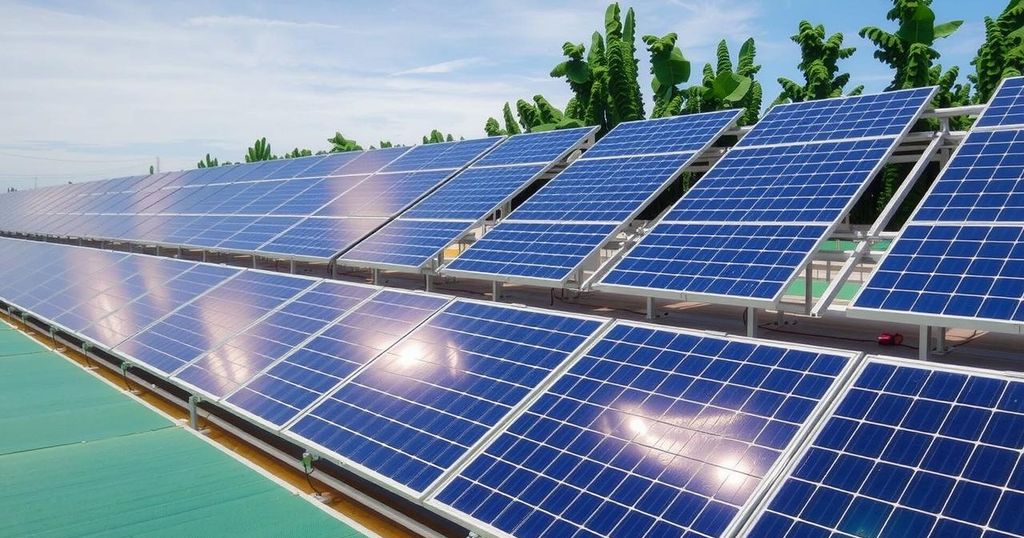Navigating the Future of Malaysia’s Solar Industry Amidst Potential Tariffs

The Malaysian solar industry faces uncertainty due to potential new tariffs under a second Trump administration. Malaysian academic Tham Siew Yean advocates for enhancing local content to remain competitive instead of relocating. Past tariffs have affected investment, but ongoing Chinese investments reflect a resilient market. Investigations into tariff circumventions complicate the landscape as future tariff decisions are awaited in 2025.
In light of potential new solar tariffs imposed on Southeast Asian nations by a looming second Trump administration, Malaysian academic Tham Siew Yean proposes that the industry should focus on enhancing local content rather than shifting operations to evade tariffs. Malaysia has been an attractive destination for foreign direct investment (FDI) in the solar sector since 2008, offering numerous incentives that led notable companies like First Solar, SunPower, and Jinko Solar to establish operations there.
Under Donald Trump’s initial presidency, substantial tariffs were levied on solar imports, starting at 30% in February 2018, which were intended to decrease yearly until reaching 15% by 2022. These tariffs covered a wide range of products related to solar cells. In June 2022, amid the tariffs, President Biden implemented a temporary moratorium to stimulate US solar manufacturing. This allowed duty-free imports of specific solar products for 24 months, impacting the trade dynamics for Malaysia’s solar industry.
The US Department of Commerce has investigated Cambodia, Malaysia, Thailand, and Vietnam for possible tariff circumvention, particularly focusing on Chinese companies processing goods in these regions to avoid tariffs. While certain prominent companies, such as Hanwha Q CELLS and Jinko Solar, were cleared from circumventing regulations, others that failed to respond to the investigation were flagged for such practices. Final tariff decisions are pending, scheduled for 2025, following Biden’s moratorium, which temporarily alleviated taxes on certain imports.
Both countervailing and anti-dumping duties were discussed regarding imports from the aforementioned nations, impacting significant players like Jinko Solar. Interestingly, despite the tariffs, Chinese investments in Malaysia’s solar sector have continued. For instance, LONGi Green Energy plans to invest RM1.8 billion to establish a new plant in Selangor, underscoring the resilience of the industry, even amid tariffs. However, potential expansions in tariff scopes could threaten this stability and encourage further relocation of manufacturing plants.
Companies like Jinko Solar are considering new manufacturing sites in countries like Saudi Arabia as they reassess their strategies amidst ongoing tariff fluctuations. The uncertainty surrounding future tariffs might stifle new investments in Malaysia until the outcome is clear. Diversifying export markets may offer a tactical advantage, while enhancing local manufacturing capabilities could help companies maintain competitiveness.
The solar industry in Malaysia has faced significant challenges due to fluctuating tariffs imposed by the US government, particularly during the Trump and Biden administrations. The imposition of tariffs under Trump’s first term marked a shift towards protecting domestic manufacturing, prompting many solar companies in Malaysia to reassess their operational strategies. As investigations continue into potential tariff circumventions and ongoing trade negotiations, the landscape for solar investments remains complex, urging Malaysian firms to contemplate strategic adjustments and innovative approaches to maintain their competitive edge in a challenging environment.
In conclusion, the potential expansion of solar tariffs under a second Trump administration poses imminent challenges for Malaysia’s solar industry. While local enhancements and strategic diversification may offer temporary relief, the long-term implications of these tariffs necessitate careful navigation. Continuous evaluation and adaptation to the evolving regulatory framework will be crucial for maintaining investment flows and industry growth in Malaysia’s solar sector.
Original Source: www.thinkchina.sg








